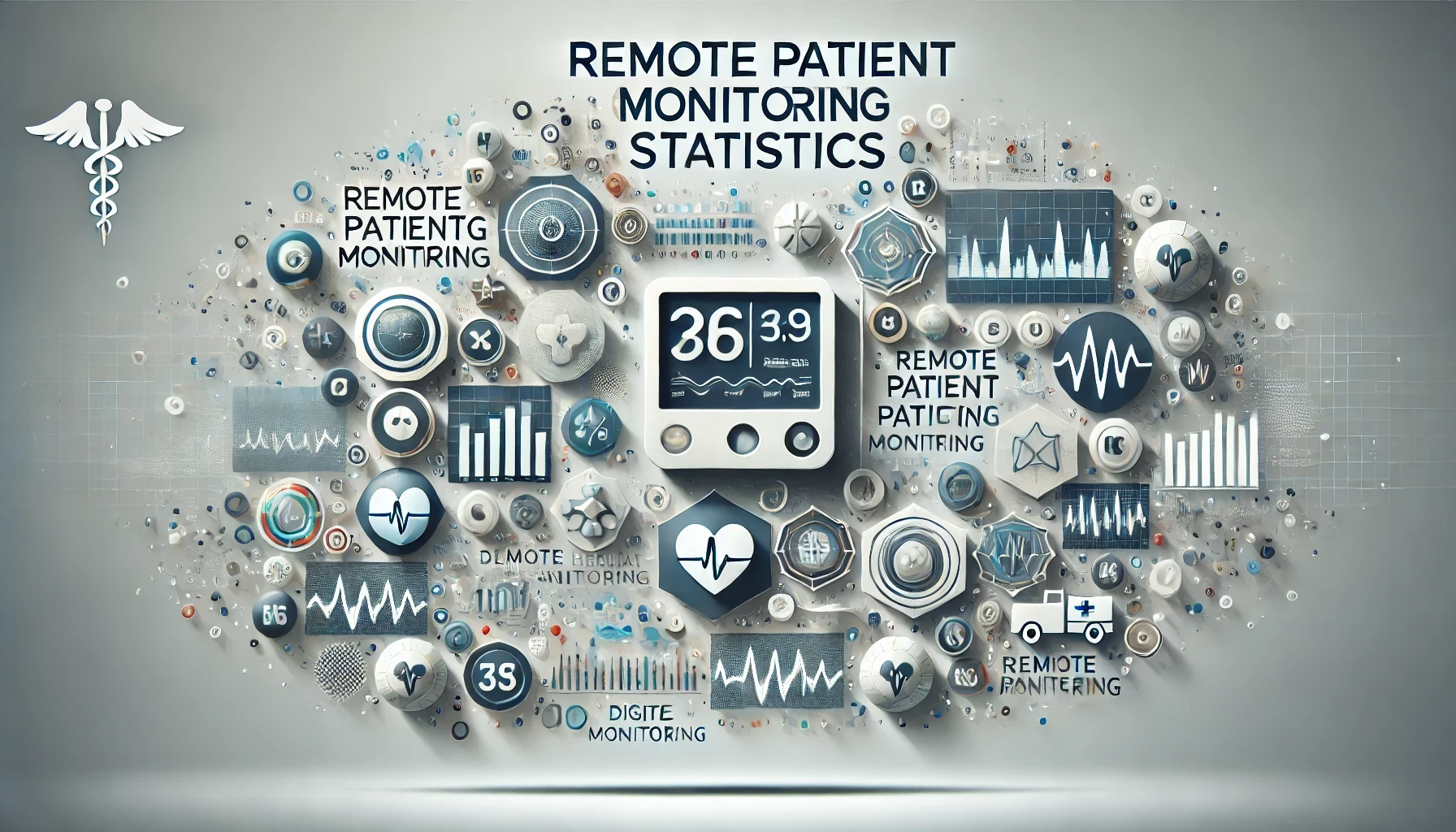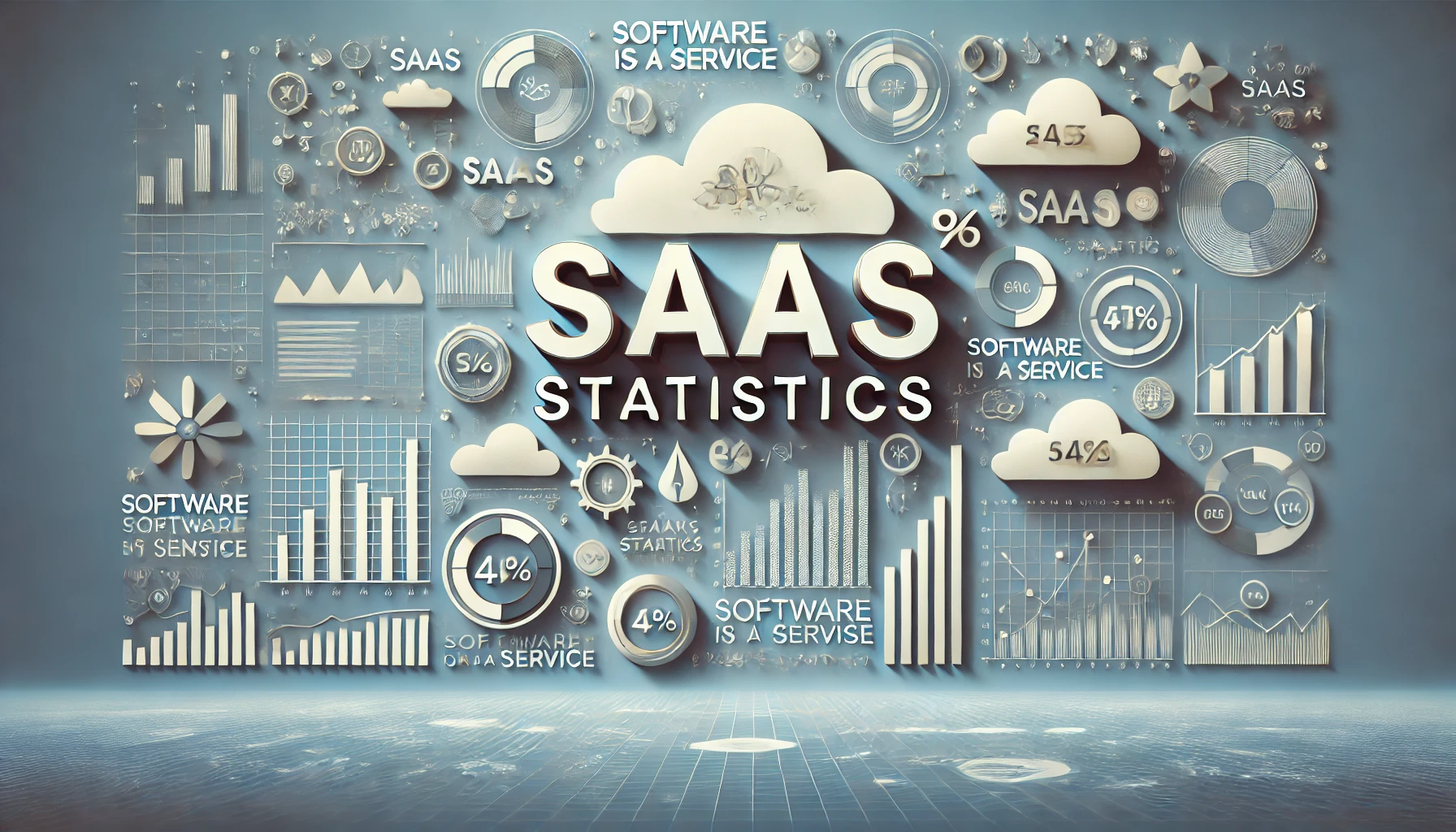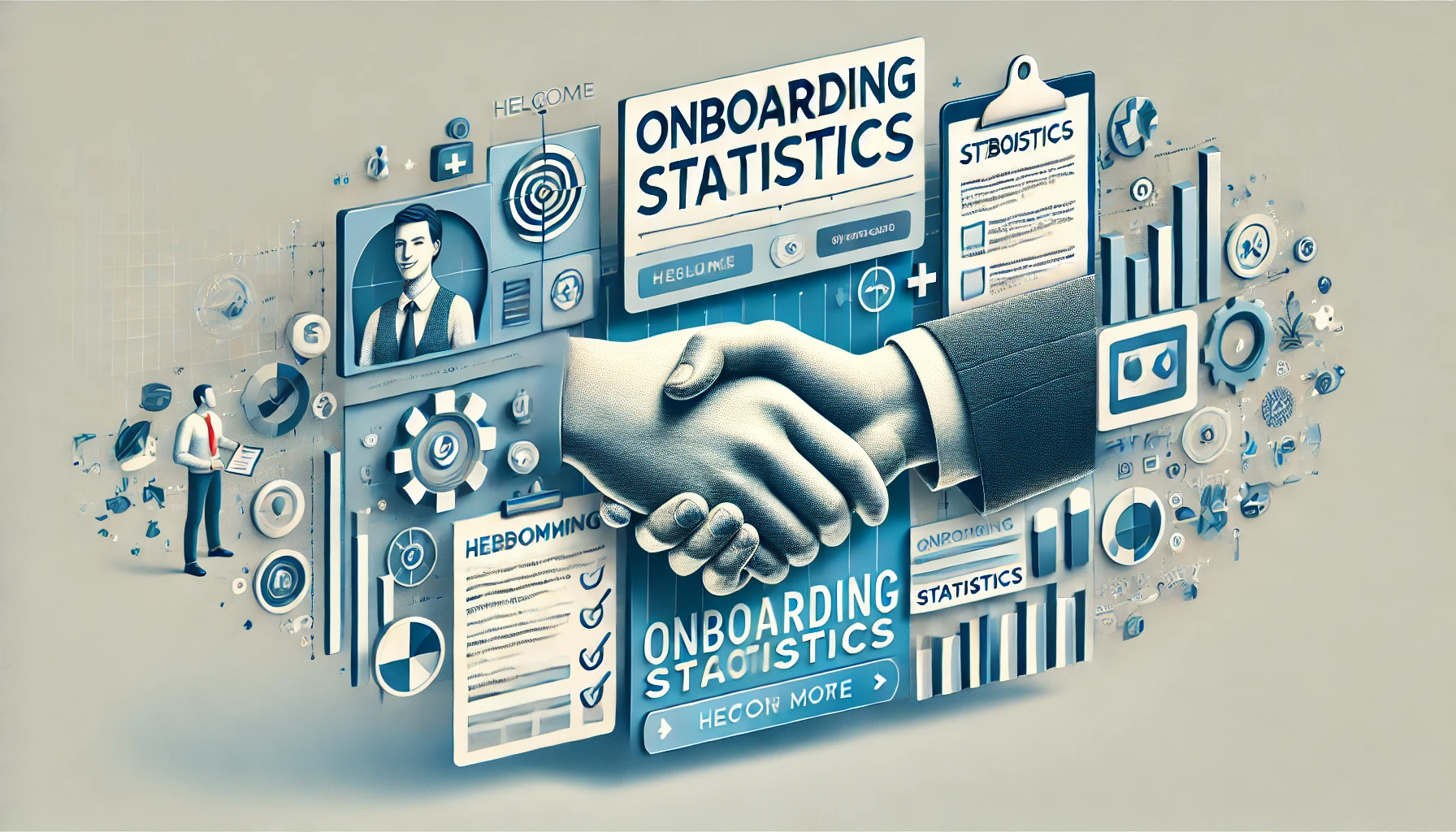Emotional Intelligence Statistics By Demographic, Age, Success, Region And Importance
Updated · Aug 16, 2024
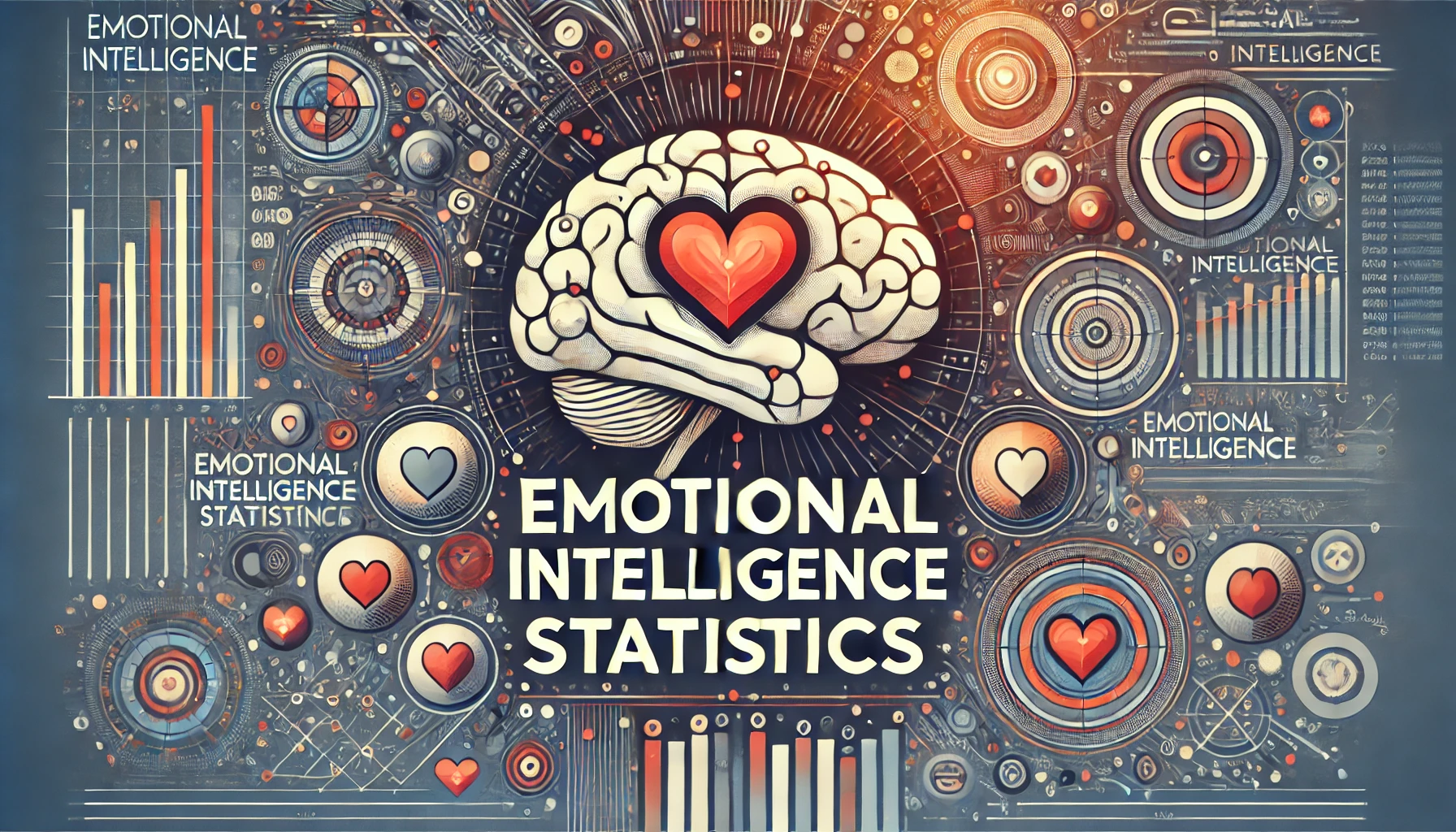
WHAT WE HAVE ON THIS PAGE
- Introduction
- Editor’s Choice
- What is Emotional Intelligence?
- Why Is Emotional Intelligence Essential In The Workplace?
- General Emotional Intelligence Statistics
- Importance Of Emotional Intelligence In Career Advancements
- Ineffective Project Working Are The Challenges
- Impact Of Emotional Intelligence On Performance
- Emotional Intelligence At Workplace Statistics
- Emotional Intelligence And Success
- Emotional Intelligence By Demographics
- Emotional Intelligence Strategies
- Why Use EQ?
- Emotional Intelligence Regional Demand And Importance
- How To Deal With Low Emotional Intelligence
- Conclusion
Introduction
Emotional Intelligence Statistics: In organizations where technical skills are highly valued, emotional intelligence (EI) often doesn’t get the attention it deserves. However, when we look deeper into what drives employees and organizations to succeed, we see that emotional intelligence is not just an extra skill but a key one that enhances all other abilities. Emotional intelligence means being good at understanding and managing emotions, both your own and others, and using that understanding in different situations.
People with high emotional intelligence can handle social challenges effectively, create strong relationships, and make thoughtful decisions that consider both logical and emotional aspects. We shall shed more light on Emotional Intelligence Statistics through this article.
Editor’s Choice
- Emotional intelligence is among the top 10 most sought-after skills and will remain important at least until 2025.
- People with high emotional intelligence (EQ) earn about $29,000 more per year than others.
- Emotional intelligence predicts 67% of a leader’s effectiveness.
- Companies that focus on hiring and training emotionally intelligent employees experience 22% more revenue growth.
- Emotional intelligence can predict more than 75% of job success.
- Emotional Intelligence Statistics stated that 90% of the best performers have high emotional intelligence.
- Emotional intelligence contributes to 58% of success in any job.
- Emotional intelligence is a better predictor of career success than IQ.
- Employees with high emotional intelligence perform 127% better than those with low emotional intelligence.
- 42% of companies worldwide provide emotional intelligence training for their senior managers.
- Emotional intelligence explains 90% of what sets top performers apart from their peers.
- People with high emotional intelligence are four times more likely to be seen as effective leaders by their peers.
- Emotional intelligence accounts for up to 70% of a person’s overall success in life.
- Higher emotional intelligence is linked to better mental health and less stress.
- 75% of jobs are affected by issues related to emotional skills, such as trouble handling interpersonal problems and poor team leadership during tough times.
- Emotional intelligence is linked to higher job satisfaction and lower employee turnover, as stated by Emotional Intelligence Statistics.
- Teams with high emotional intelligence achieve higher productivity and more innovation.
What is Emotional Intelligence?
Emotional intelligence (EI) is the ability to see, use, understand, and control emotions. People with high EI can identify their feelings and those of others, use emotions to guide their thoughts and actions, distinguish between different emotions and name them correctly, and adjust their emotions based on their surroundings.
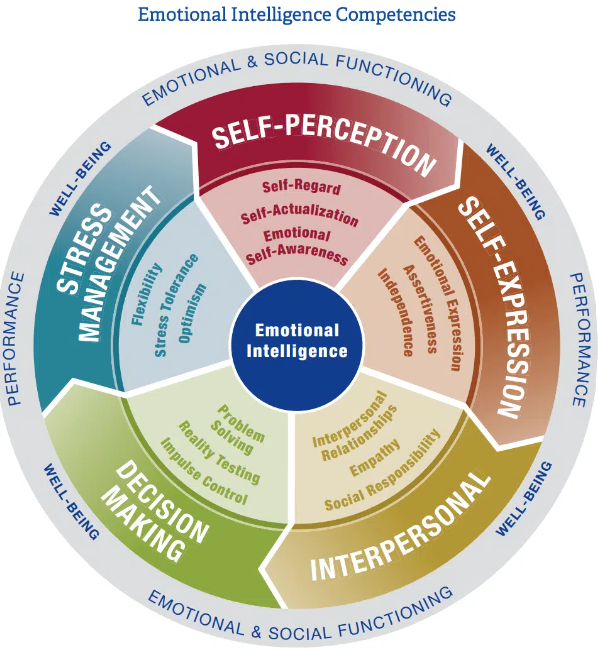
(Source: passivesecrets.com)
Research shows that people with high EI tend to perform better at work, though it’s not clear if EI directly causes this improvement. EI is often linked with empathy because it involves relating personal experiences to others. As EI has gained popularity, more people are looking for ways to develop it to become better leaders.
Some critics question whether EI is a true form of intelligence and if it offers extra benefits beyond IQ and the Big Five personality traits. However, research has found that some measures of EI are valid, even when considering IQ and personality traits.
Why Is Emotional Intelligence Essential In The Workplace?
In its best form, emotional intelligence allows people to truly understand someone else’s perspective, even if it’s different from their own. Emotional intelligence can bring many benefits to today’s workplace and everyone involved:
- It helps leaders motivate and inspire their teams by understanding what drives others.
- It encourages diverse viewpoints and helps prevent the problems of groupthink.
- It enables leaders to spot and seize opportunities that others might miss.
- It helps resolve conflicts fairly and addresses issues.
- It boosts morale and helps people reach their full professional potential.
Like rational intelligence, emotional intelligence can be developed with effort and practice. A good starting point is to focus on self-reflection—understanding your thoughts, feelings, and biases can lead to better decisions. Using emotional intelligence often means acting with confidence, ignoring status concerns, and avoiding quick, emotional reactions.
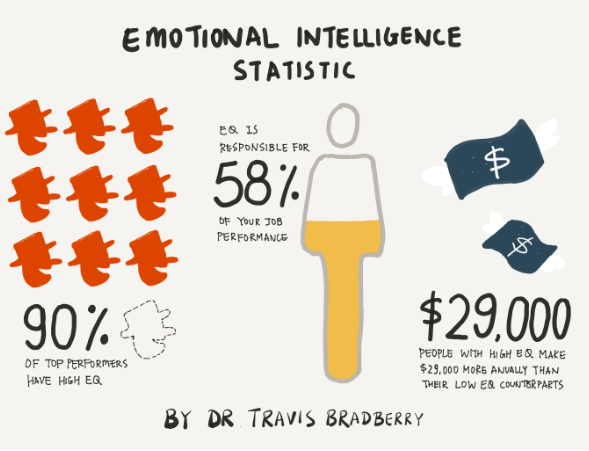 (Source: hiringplug.com)
(Source: hiringplug.com)
Here’s Why Emotional Intelligence is Important in the Workplace:
- It Helps in Hiring
While technical skills can be taught, emotional intelligence is harder to develop. Companies can use emotional intelligence theories in their hiring and training processes. For example, entry-level candidates might be assessed for their “EQ” during job competitions or promotions. Employees identified as having strong leadership potential may perform better if emotional intelligence is part of their development.
- It Supports Success in a Global Economy
In today’s global economy, which relies heavily on collaboration, negotiation, and communication, emotional intelligence becomes increasingly important. Traits like perseverance, self-control, and handling pressure are linked to emotional intelligence. It helps leaders, regardless of their skills, to adapt to changes and manage challenges.
While traditional intelligence will always be crucial, even highly technical roles now involve more interaction with diverse people and complex situations. Both rational and emotional intelligence are essential, and effective leaders develop and balance both.
General Emotional Intelligence Statistics
- 90% of top performers have better-than-average emotional intelligence.
- Emotional intelligence is responsible for 58% of job performance.
- 75% of Fortune 500 companies offer emotional intelligence training.
- The need for EQ skills is expected to grow six times in the next 3-5 years.
- The emotional intelligence market was valued at $868 million in 2021 and is expected to grow at a rate of 25.2% per year from 2022 to 2030.
- EQ influences 58% of job performance, and 90% of top workplace performers have high emotional intelligence.
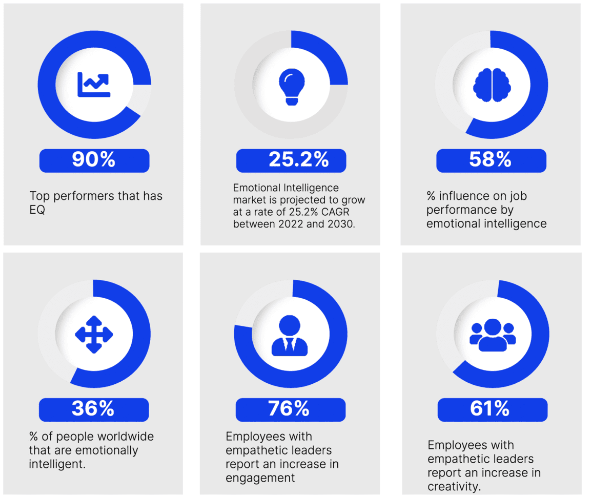 (Source: passivesecrets.com)
(Source: passivesecrets.com)
- People with high emotional intelligence make, on average, $29,000 more.
- For each point increase in emotional intelligence, an annual salary rises by $1,300.
- Emotional Intelligence Statistics stated that Emotional intelligence accounts for over 60% of people’s personal and professional success.
- Only about 36% of people around the world are emotionally intelligent.
- Up to 60% of people feel emotionally disconnected from their work.
- Employees with empathetic leaders see a 76% increase in engagement and a 61% boost in creativity, leading to better performance.
- Companies that focus on emotional intelligence are 22 times more likely to outperform those that do not.
- 52% of companies choose senior management based on emotional intelligence skills.
- Over 36% of business leaders believe that emotional intelligence will soon be a required skill.
Importance Of Emotional Intelligence In Career Advancements
For years, professionals have been told that emotional intelligence is key to succeeding at work and advancing in their careers. This is now clearly the case. Emotional intelligence is not only a skill that hiring teams look for, but it also influences who gets promoted and receives raises.
- The need for emotional skills is expected to increase by 26% by 2030.
- Emotional intelligence is among the top 10 most sought-after skills and will remain important at least until 2025.
- People with high emotional intelligence earn, on average, $29,000 more per year than those with low emotional intelligence. Each point increase in emotional intelligence adds $1,300 to an annual salary.
- According to Emotional Intelligence Statistics, 75% of managers use emotional intelligence to determine if employees are ready for promotion or a raise.
- Emotional intelligence is the strongest predictor of job performance, accounting for 58% of success across all types of jobs.
- 57% of people managers say that their top-performing employees have strong emotional intelligence.
Ineffective Project Working Are The Challenges
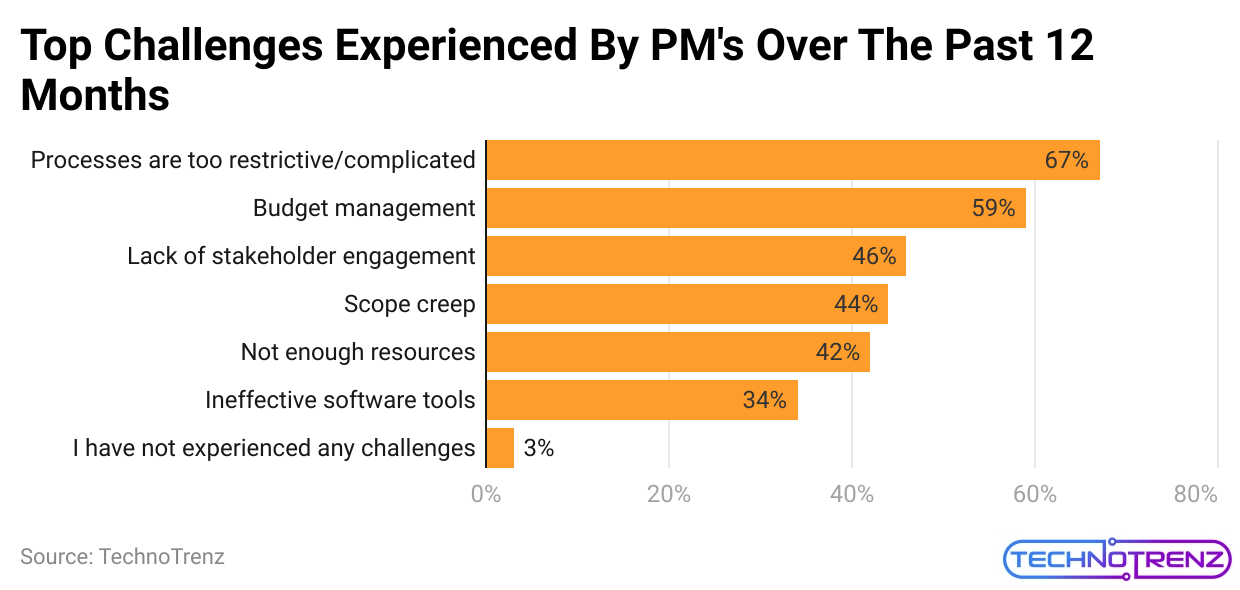 (Reference: capterra.com)
(Reference: capterra.com)
|
Challenges |
Percentage |
| Processes are too restrictive/complicated |
67% |
|
Budget management |
59% |
| Lack of stakeholder engagement |
46% |
|
Scope creep |
44% |
| Not enough resources |
42% |
|
Ineffective software tools |
34% |
| I have not experienced any challenges |
3% |
- Following is the comparison of top challenges witnessed by high and low-EQ project managers
|
|
Low-EQ respondents | High-EQ respondents |
| Budget management | 43% |
64% |
|
Lack of Stakeholders |
50% | 48% |
| Scope creep | 50% |
37% |
|
Not enough resources |
52% | 37% |
| Processes are too restrictive or complicated | 77% |
64% |
Impact Of Emotional Intelligence On Performance
- People with high emotional intelligence get job performance ratings that are six times higher.
- Emotional intelligence training programs can boost productivity by 50%
- Emotional intelligence training can improve customer satisfaction ratings by 13%.
- Emotional intelligence training programs can make teamwork 46% more effective.
- Emotional Intelligence Statistics stated that employees with high emotional intelligence take an average of 2.7 sick days per year, while those with low emotional intelligence take an average of 6.2 sick days.
- Emotional intelligence training can raise sales performance by 27%.
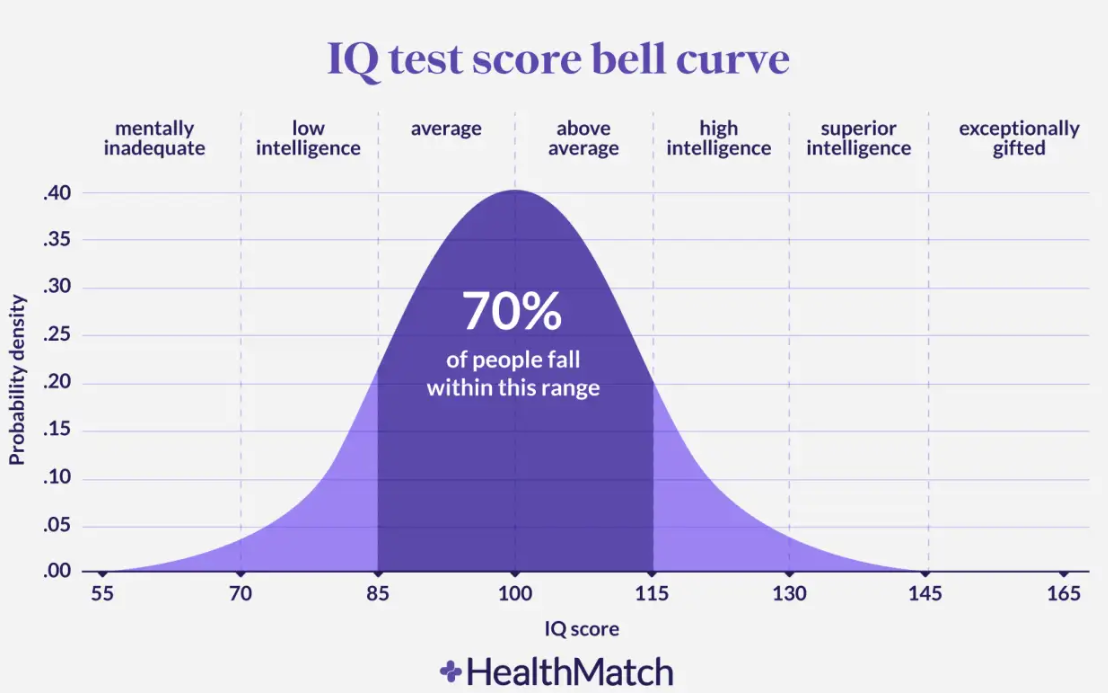 (Reference: healthmatch.io)
(Reference: healthmatch.io)
- In the above chart, we can study the IQ test score bell curve.
- People with high emotional intelligence are 1.2 times more likely to be rated as top performers.
- Emotional intelligence (EQ) accounts for 58% of how well someone performs at their job.
- 90% of top performers have high emotional intelligence.
- Emotional intelligence can predict more than 75% of job success.
- 90% of the best performers have high emotional intelligence.
- Emotional Intelligence Statistics state that children with high emotional intelligence tend to do better in school.
- Emotional intelligence is responsible for 58% of success in any job.
- Emotional intelligence training can increase a company’s profits by 29%.
- Emotional intelligence helps with resolving conflicts more effectively.
Emotional Intelligence At Workplace Statistics
- 42% of companies worldwide provide emotional intelligence training for their senior managers.
- In a 2020 survey, over 95% of entrepreneurs said EQ in leadership is more important than IQ.
- Nearly 60% of founders believe that, due to recent challenges like the pandemic and racial justice issues, focusing on EQ is more important than ever. They also think building trust is the most important EQ skill.
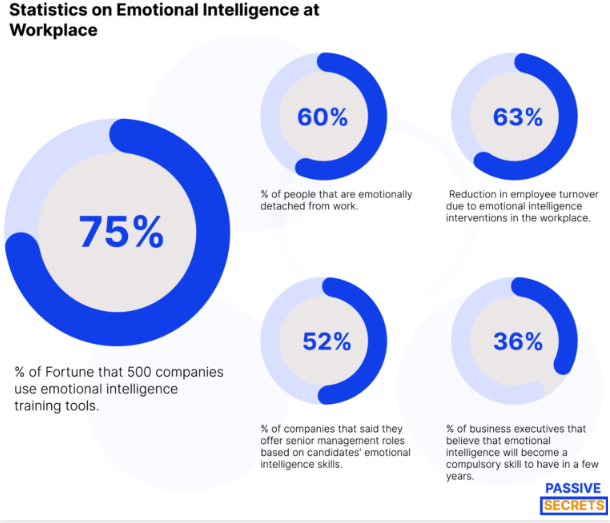
(Source: passivesecrets.com)
- People with high EQ earn $29,000 more per year compared to those with low EQ.
- Over 80% to 90% of the skills that set top performers apart are related to emotional intelligence.
- According to emotional intelligence statistics, 87% of Millennials are driven by their leaders’ emotional intelligence to help their company succeed.
- Training in emotional intelligence can reduce employee turnover by 63%.
- 52% of companies select senior managers based on their emotional intelligence skills.
- More than 36% of business leaders believe emotional intelligence will become essential soon.
- 75% of HR professionals value an employee’s EQ more than their IQ.
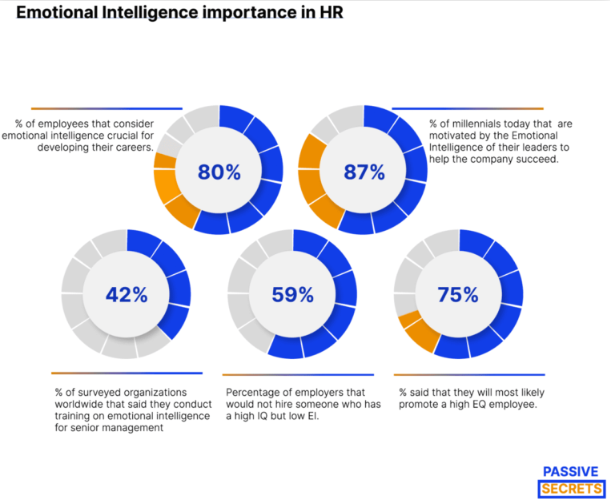
(Source: passivesecrets.com)
- 80% of employees think emotional intelligence is crucial for their career growth.
- 59% of employers won’t hire someone with a high IQ but low EQ, and 75% are likely to promote someone with a high EQ.
- Over 80% of millennials think coaching and classroom training are the best ways to develop emotional intelligence skills.
- Empathetic Leaders perform 40% better in coaching, decision-making, and communication compared to those who are not.
- 72% of employees say that being treated with respect at all company levels is the most important factor in job satisfaction.
- Emotional Intelligence Statistics stated that 75% of Fortune 500 companies use emotional intelligence (EQ) training tools.
- Up to 60% of people feel emotionally disconnected from their jobs.
- Companies that focus on emotional intelligence are 22 times more likely to do better than those that don’t.
- Poor emotional intelligence in a company results in higher stress, lower productivity, and damaged trust, among other problems.
Emotional Intelligence And Success
- People with high emotional intelligence earn about $29,000 more per year than those with lower emotional intelligence.
- Emotional intelligence is often a better predictor of success than IQ in many areas of life.
- People with high emotional intelligence are 50% more likely to succeed in leadership roles.
- 85% of financial success comes from “human skills,” including personality, communication, negotiation, and leadership.
- Emotional intelligence accounts for up to 80% of the factors that lead to success in life.
- Emotional intelligence improves teamwork and collaboration.
- Emotional intelligence helps with managing stress better.
- Individuals with high emotional intelligence are more likely to be promoted in their jobs.
- Emotional intelligence is linked to higher job engagement and satisfaction.
- Emotional intelligence leads to greater empathy and understanding in the workplace.
- Emotional intelligence helps with resolving conflicts better at work.
- Emotional intelligence (EQ) is responsible for 58% of success in all kinds of jobs.
- Emotional intelligence can be a better predictor of career success than cognitive intelligence (IQ).
- Companies with strong emotional intelligence have more productive and engaged employees, as per Emotional Intelligence Statistics.
- Emotional intelligence directly affects how often employees leave a company.
- Emotional intelligence is crucial for handling conflicts well.
Emotional Intelligence By Demographics
- Gender Differences:
- Women usually show slightly higher levels of overall Emotional Intelligence, including interpersonal and intrapersonal skills, empathy, and self-awareness, than men.
- However, the difference is small. There are no noticeable differences between genders in self-regulation, motivation, or social skills.
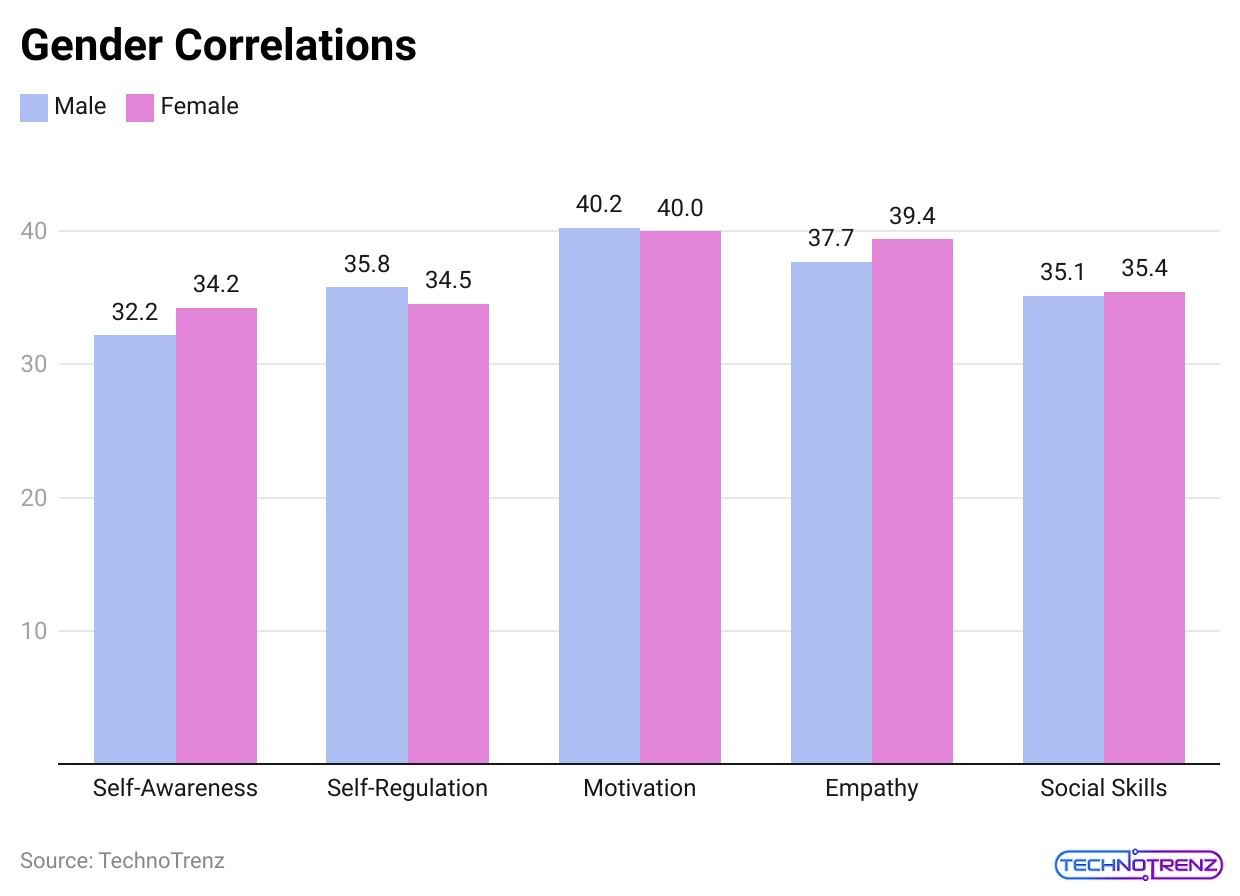 (Reference: hptbydts.com)
(Reference: hptbydts.com)
- Age Differences:
- Emotional intelligence, measured by the Emotional Intelligence Inventory, generally increases as people age.
(Reference: hptbydts.com)
- Personality Differences:
- The personality test used in this analysis was the EQmentor Personality Inventory.
|
|
Extraversion | Agreeableness | Conscientiousness | Emotional Stability | Openness |
| Self-Awareness | .331 | .591 | .324 | .352 |
.454 |
|
Self-Regulation |
.175 | .429 | .350 | .665 | .383 |
| Motivation | .351 | .430 | .417 | .455 |
.448 |
|
Empathy |
.298 | .723 | .292 | .305 | .465 |
| Social Skills | .593 | .566 | .331 | .425 |
.467 |
Top 3 Strongest Connections (in order):
- Empathy and Agreeableness: more empathetic People are usually more considerate, friendly, and cooperative.
- Self-Regulation and Emotional Stability: Those who manage their emotions well are often calm, confident, and less likely to be anxious.
- Social Skills and Extraversion: People with strong social skills are generally outgoing and energetic.
Inter-correlations:
Here are the connections between different sub-scales within the EQ Assessment:
|
|
Self-Awareness | Self-Regulation | Motivation | Empathy | Social Skills |
| Self-Awareness | 1 | .439 | .577 | .666 |
.605 |
|
Self-Regulation |
.439 | 1 | .656 | .444 | .517 |
| Motivation | .577 | .656 | 1 | .499 |
.615 |
|
Empathy |
.666 | .444 | .499 | 1 | .637 |
|
Social Skills |
.605 | .517 | .615 | .637 |
1 |
Emotional Intelligence Strategies
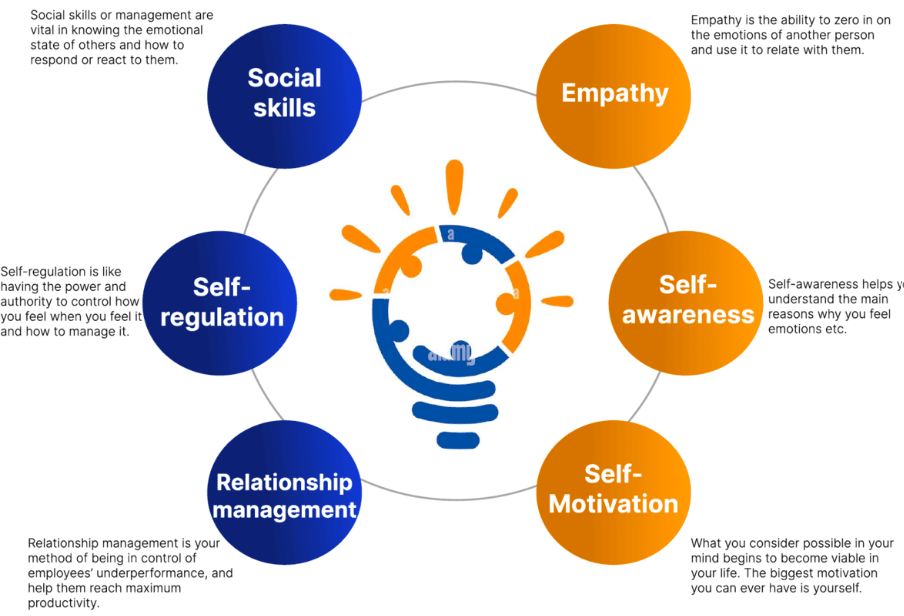 (Reference: passivesecrets.com)
(Reference: passivesecrets.com)
- Creating a Positive Work Environment
- Having a positive work environment is very important because it helps everyone on the team perform their best.
- David Goleman’s book, “Why Emotional Intelligence Can Be More Important Than IQ”, explains how developing emotional intelligence (EQ) can lead to significant benefits in business.
Why Use EQ?
- Increase Motivation: EQ helps boost your motivation and that of your colleagues, which can lead to higher productivity at work.
- Improve Awareness: EQ allows you to make positive changes in the workplace by being aware of your own emotions and those of others.
- Assist Leaders: EQ is valuable for leaders in training, mentoring, and effectively assessing team members.
- Enhance Problem-Solving: EQ supports better problem-solving and helps build strong workplace relationships.
- Top Performers: 90% of top performers have high EQ, while only 20% have high IQ. This shows how crucial EQ is for success.
Developing Emotional Intelligence
Emotional intelligence isn’t something you’re born with; it’s a skill you can develop through practice. There are six key areas of EQ:
- Empathy: Understanding and sharing the feelings of others.
- Self-awareness: Knowing your own emotions and how they affect your behavior.
- Self-motivation: Using your emotions to stay motivated and reach your goals.
- Social Skills: Managing relationships and building strong networks.
- Self-Regulation: Controlling your emotions and reactions.
- Relationship Management: Handling interactions with others positively and effectively.
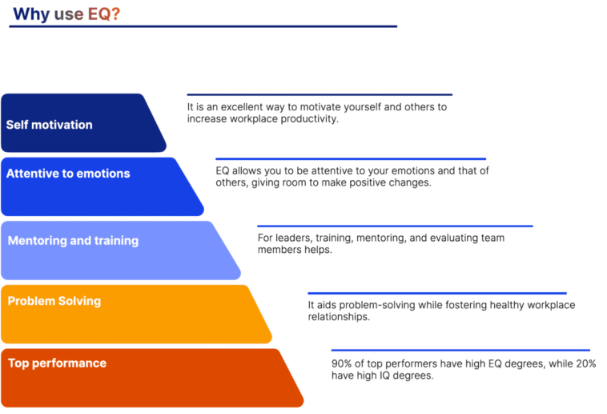 (Source: passivesecrets.com)
(Source: passivesecrets.com)
Empathy
- Empathy means understanding and connecting with how others feel.
- It involves figuring out why people act a certain way and responding to their emotions appropriately.
- Being empathetic helps you handle tough situations and build better relationships.
- How to Practice Empathy at Work:
- Imagine Their Feelings: Try to see things from the other person’s perspective.
- Reflect on Your Feelings: Understand why you feel a certain way and how it affects others.
- Put Others First: Make an effort to consider and address the emotional needs of your colleagues.
Self-Awareness
- Self-awareness is about recognizing your own emotions and understanding how they affect your behaviour.
- It’s important to know why you feel a certain way and make positive changes.
- How to Practice Self-Awareness:
- Daily Check-In: Write down your feelings each day, even if it’s just a few words.
- Ask Yourself Why: Think about why you have certain feelings and what causes them.
- Seek Feedback: Regularly ask for feedback from colleagues to understand your performance and emotions.
- Handle Negative Feelings: Note ways to manage and improve negative emotions or situations.
Self-Motivation
- Self-motivation is about having the drive to reach your goals and stay enthusiastic about your work.
- How to Practice Self-Motivation:
- Set Goals: Start your week by listing goals and how you want to feel while achieving them.
- Identify What You Like: Write down what you enjoy about your job and work environment.
- Counter Negative Thoughts: When you feel negative, remind yourself of your strengths and reasons to keep going.
Social Skills
- Social skills involve interacting effectively with others and managing relationships. They help you understand and respond to other people’s emotions.
- How to Practice Social Skills:
- Listen Carefully: Pay close attention during conversations to pick up on others’ emotions.
- Know Your Team: Learn about your colleagues’ behaviors and personalities to interact better.
- Manage Your Emotions: Use your social skills to control your emotions during interactions.
- Persuade Others: Practice influencing others positively, in addition to using logic.
Self-Regulation
- Self-regulation is the ability to control one’s emotions and reactions. It helps one manage negative emotions and avoid letting them affect one’s behavior.
- How to Practice Self-Regulation:
- Pause Before Acting: Take a moment to cool down before reacting in tense situations.
- Prepare for Challenges: Expect difficulties and manage your responses effectively.
- Reduce Stress: Find ways to relieve stress, such as enjoying coffee, using motivational quotes, exercising, or meditating.
Relationship Management
- Relationship management is about handling conflicts, guiding employees, and motivating them to do their best.
- How to Practice Relationship Management:
- Resolve Conflicts: Listen to all sides of a conflict and address it fairly.
- Deal with Issues Quickly: Address problems as they come up to prevent them from getting worse.
- Monitor Performance: Watch employee performance and morale and support those who are struggling.
- Communicate and Motivate: Regularly talk with your team and use incentives to boost their morale and productivity.
Effect of Emotional Intelligence on Companies
- Impact on Job Performance:
- Emotional intelligence influences job performance by 58%.
- Companies should invest in emotional intelligence training for their employees. This helps boost EQ scores and improves job performance.
Restaurant Profits
- Restaurants run by people with high EQ see their profits grow by 22% each year.
- High emotional intelligence has a clear impact on business profits.
- Key factors like self-awareness, happiness, social responsibility, and strong relationships are all part of emotional intelligence and contribute to productivity.
Employee Retention
- Workers with managers who have high EQ are four times less likely to quit compared to those with managers who have low EQ.
- When managers use emotional intelligence in their work, employees feel more secure and heard. This leads to better engagement and lower turnover rates.
Top Performers
- 90% of the best-performing employees have high emotional intelligence.
- Having a high EQ can improve your chances of being a top performer and getting promotions or raises.
- Although it’s still possible to succeed without high EQ, only 20% of the lowest performers have high EQ, showing that low emotional intelligence is often linked to poorer performance.
Emotional Intelligence Regional Demand And Importance
- As AI and automation grow, emotional intelligence is becoming an essential skill.
- With many routine tasks now automated, companies are focusing more on emotional intelligence (EI) skills like self-awareness, relationship management, and communication.
- Executives say employees need to develop these EI skills to handle roles that involve interacting with clients (76%) and to manage tasks that require empathy, influence, and teamwork—skills that automation can’t replace (76%).
- Emotional Intelligence Statistics stated that sixty-one percent of executives believe that emotional intelligence will be a must-have skill in the next 1 to 5 years, and 41% of employees in non-supervisory roles agree.
- Overall, 83% of companies think having employees with high emotional intelligence is crucial for future success.
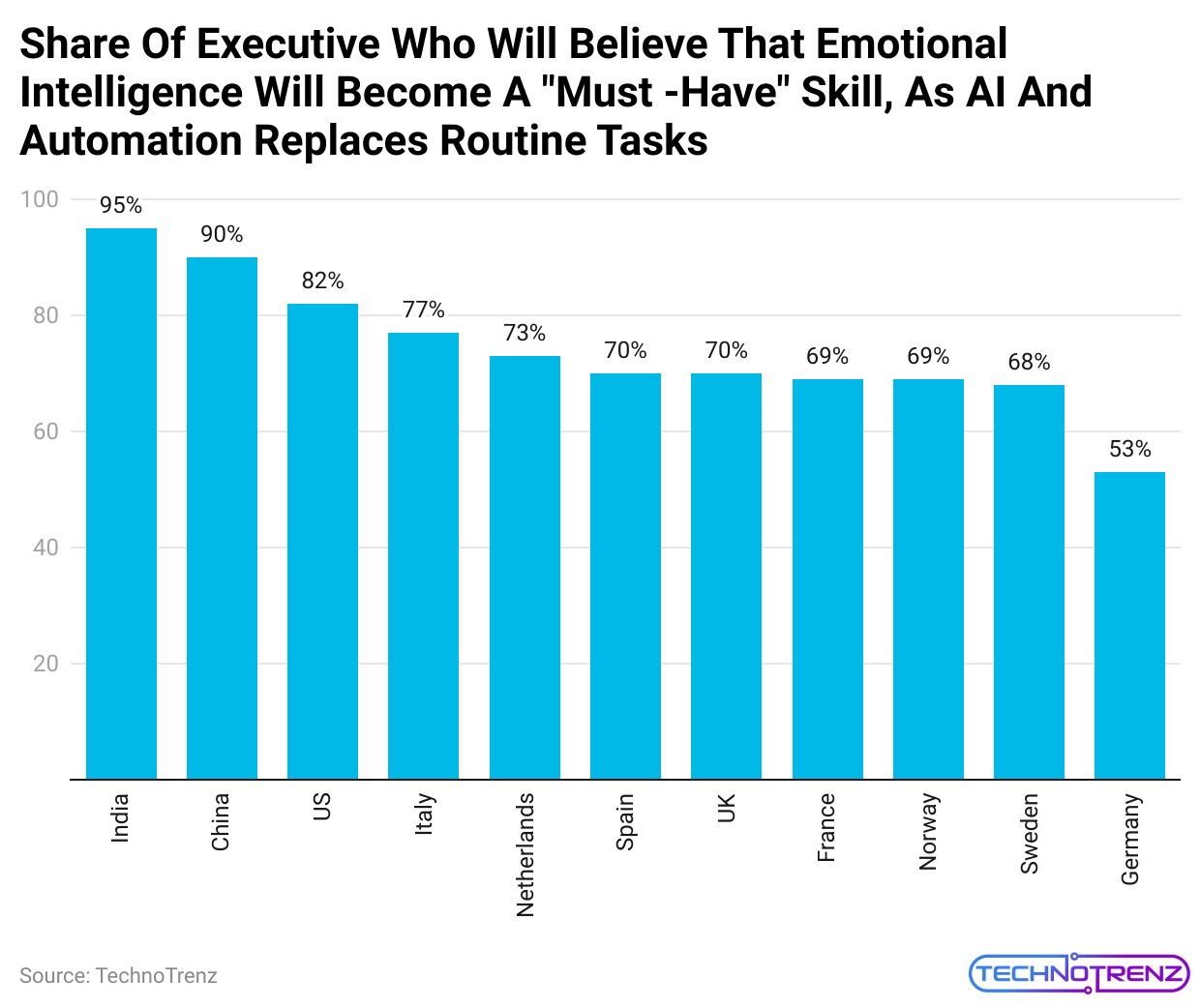 (Reference: peoplematters.in)
(Reference: peoplematters.in)
- Employees are worried about how automation and AI might make their skills less relevant.
- In the past two years, the number of employees who think their skills will become outdated due to automation and AI has jumped by ten percentage points.
- Now, 39% of employees believe their skills will be obsolete in the next two to three years, up from 30%.
- Emotional intelligence statistics state that this concern has grown from 40% to 50% among millennials.
- This shows that millennials are increasingly aware of how automation and AI will affect their jobs and are feeling more anxious about it.
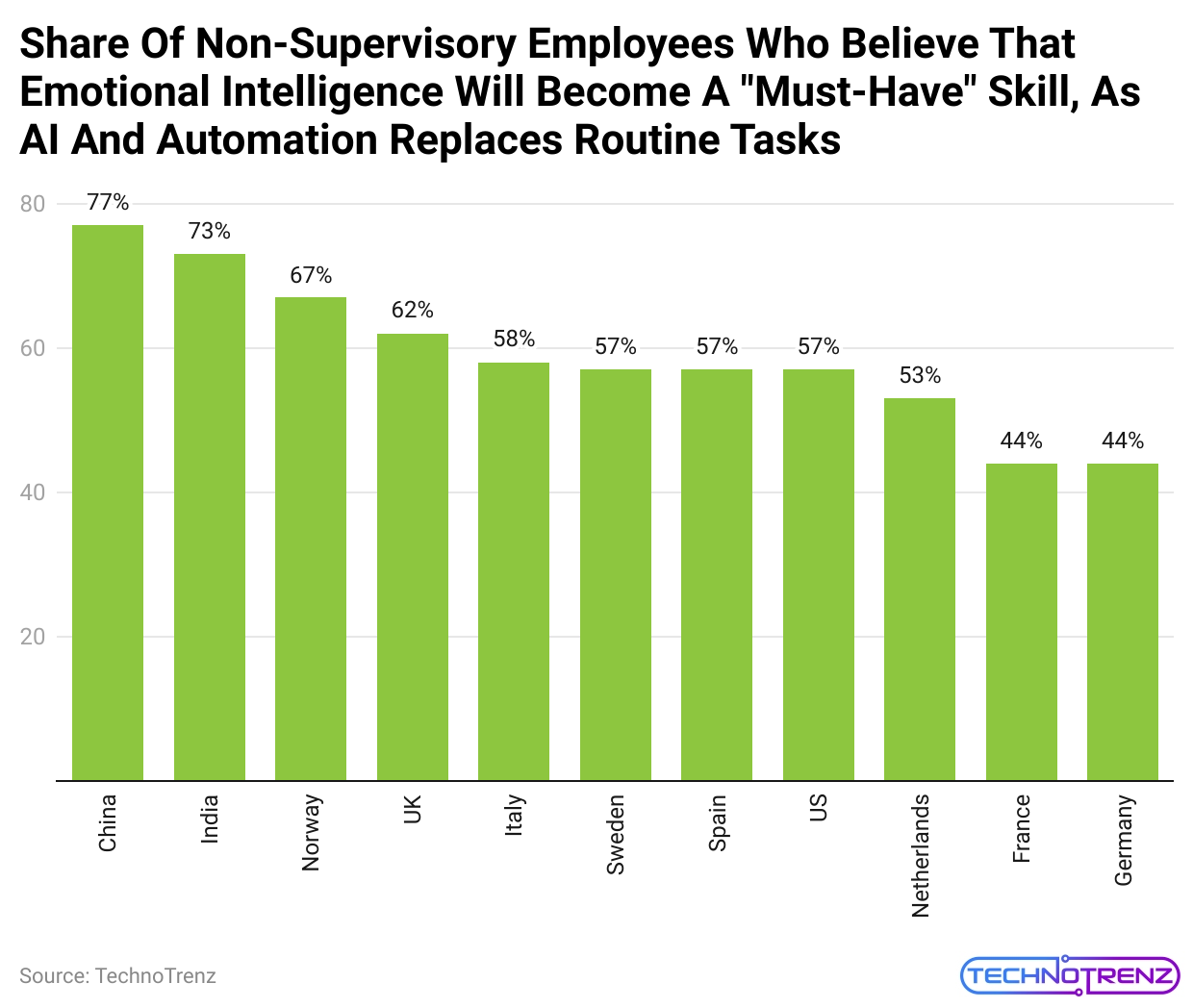 (Reference: peoplematters.in)
(Reference: peoplematters.in)
- Companies with emotionally intelligent employees are seeing great results.
- Companies with workers who have high emotional intelligence (EI) are experiencing significant benefits.
- Due to high EI, on average, 60% of these companies see more than a 20% improvement in key areas.
- The main advantages include increased productivity, higher employee satisfaction, and a larger market share.
- Research shows that companies investing in EI can get a return on investment (ROI) between 2.2x and 4.4x when considering impacts on revenue, productivity, costs, and employee turnover.
- Companies should also create a culture that values EI and seeks continuous improvement.
They should focus on:
- Updating training programs to include EI and make them available to all employees.
- Changing hiring practices to assess EI.
- Considering EI when promoting and rewarding employees.
- Using technology and data to build a strong EI culture.
- However, many companies have not updated their practices to accommodate the new reality of automation, especially for non-supervisory staff.
- Even though 75% of companies believe they can improve their employees’ emotional intelligence (EI) skills, only 42% offer training for senior managers, 32% for middle managers, and just 17% for non-supervisory employees, according to Emotional Intelligence Statistics.
- Since non-supervisory roles are most affected by automation, less than 40% of companies check EI skills during hiring or assess them in current non-supervisory employees.
- The research suggests that companies need to include EI in their practices and use both top-down and bottom-up approaches to build a high-EI workforce.
How To Deal With Low Emotional Intelligence
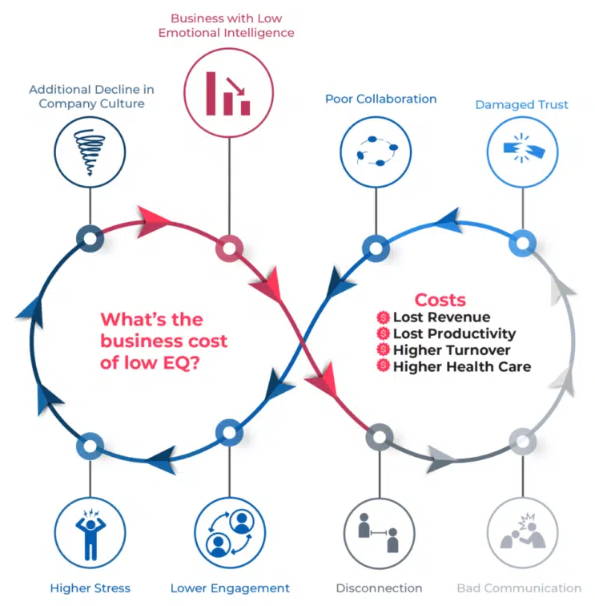 (Source: passivesecrets.com)
(Source: passivesecrets.com)
Recognize Other People’s Feelings
- Strong leaders don’t ignore others’ feelings; instead, they might try to minimize or “fix” them to keep things moving.
- This isn’t just a male issue but a broader “power problem.” People who don’t acknowledge others’ feelings may not realize these emotions can affect how things are done.
- The next time a team member shows strong emotions, ask them about them. Listen carefully and summarize what you hear.
- Validating their feelings helps them feel understood and move forward more effectively.
Keep Track of Your Emotions
- To effectively use these tips, you need to be aware of your own emotions. You might think you’re good at hiding them, but many leaders struggle with understanding how their feelings impact others.
- Improve by paying close attention to your emotions, thoughts, and actions in different situations.
- This will help you understand how your feelings influence your behavior and view of reality.
Let Go of Grudges
- Holding onto grudges causes stress, triggering your body’s fight-or-flight response.
- While this is useful for immediate threats, it harms your health when the threat is long gone.
- Emory University research shows that stress from grudges can lead to high blood pressure and heart disease.
- Emotionally intelligent people avoid grudges to protect their health and well-being. Letting go of grudges not only makes you feel better but also improves your health.
Get Enough Sleep
- Sleep is vital for managing emotional intelligence. Without enough sleep, your self-control, focus, and memory suffer, and stress hormones rise.
- Leaders often skip sleep, but not getting enough rest can make it harder to manage things well.
- Prioritize getting good sleep to handle stress and maintain emotional balance.
Stop Negative Self-Talk
- A big part of improving emotional intelligence is stopping negative self-talk. The more you focus on negative thoughts, the more power they have.
- Most negative thoughts are just thoughts, not facts. If you find yourself thinking negatively, write down those thoughts.
- This helps slow down the negativity and lets you evaluate if the thoughts are true.
- Words like “never” or “worst” often mean your brain is exaggerating.
- Writing down and discussing these thoughts with a trusted friend can help you see things more clearly.
Show Appreciation
- One easy way to show you care is to recognize good work.
- Leaders often see great work but might not show appreciation.
- When you notice someone doing a good job, let them know.
- A quick email or a simple thank you can make a big difference.
- Acknowledging others’ efforts builds loyalty and encourages them to work even harder.
Conclusion
Successful business leaders understand that success isn’t just about luck or a simple formula. It takes well-thought-out plans and effective strategies. As a leader, you can use marketing data and tactics to improve both employee productivity and leadership skills. Starting with the hiring process, emotional intelligence plays a key role. It’s important to bring in team members who share the company’s values and beliefs.
It’s also crucial to work with people who don’t make every day a challenge, helping to create a positive and productive work environment. We have shed enough light on Emotional Intelligence Statistics through this article.
Sources
FAQ.
Everyone experiences emotions, but only a few people can accurately recognize them as they happen. Our research shows that only 36% of people can do this. When emotions are clearly identified, they often get understood, which can lead to bad decisions and ineffective actions.
It’s their EQ skills, not their IQ that make a big difference in job performance. On average, people score 75 out of 100 on the Emotional Intelligence Appraisal® across all types of jobs and industries.
Women typically score higher than men on emotional intelligence tests. However, gender stereotypes about how men and women should show their feelings can affect these scores. The difference between men and women in emotional intelligence is usually small to moderate and can be influenced by personal motivations or social surroundings.
The average EQ VAS score for people in India is 75.18, with a 95% confidence range of 74.50 to 75.90. The average utility score is 0.848, with a 95% confidence range of 0.840 to 0.857. Both EQ VAS and utility scores decrease as people get older. Men typically have higher EQ-VAS scores than women.

Saisuman is a professional content writer specializing in health, law, and space-related articles. Her experience includes designing featured articles for websites and newsletters, as well as conducting detailed research for medical professionals and researchers. Passionate about languages since childhood, Saisuman can read, write, and speak in five different languages. Her love for languages and reading inspired her to pursue a career in writing. Saisuman holds a Master's in Business Administration with a focus on Human Resources and has worked in a Human Resources firm for a year. She was previously associated with a French international company. In addition to writing, Saisuman enjoys traveling and singing classical songs in her leisure time.





